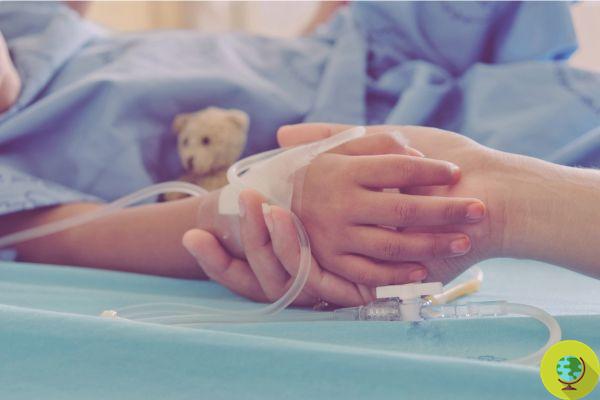
Many children who tested positive for Covid-19 would have developed a delayed "pro-inflammatory cytokine storm". What correlation with Covid-19?
Don't store avocado like this: it's dangerousCoronavirus e children: although, fortunately, the terrible virus has spared most of the children in the world, cases of children positive or with anti-coronavirus antibodies with a disease very similar to Kawasaki syndrome are being recorded in a little bit in all countries. The link between Sars-Cov-2 and the development of these symptoms, however, was still poorly understood. Now comes research that adds an important piece to this correlation.
Many children who tested positive for Covid-19 would in fact have developed a delayed "pro-inflammatory cytokine storm”, Aggravating their conditions. But what correlation is there with Covid-19?
Well, at first it was thought to be the same Kawasaki disease, only to understand that it is a very similar inflammation: in fact, at the end of April, the Pediatric Intensive Care Society in the United Kingdom warned that children of all ages may present their own one "multisystem" inflammatory state requiring intensive care, describing children with features overlapping toxic shock syndrome (TSS) and atypical Kawasaki disease (KD) with blood parameters consistent with Covid-19 in children. They observed this in children with confirmed positive SARS-CoV-2 RT-PCR infection and in children with negative RT-PCR. Even the paediatricians of Bergamo had raised the alarm.
Coronavirus: A severe inflammatory syndrome, similar to Kawasaki disease, is affecting several children in the UK
Basically, as the new American study has now confirmed, it is one multisystem inflammatory syndrome (MIS-C), a syndrome of release of Covid-19 postinfectious cytokines, resembling but not the same as other serious inflammatory diseases, including Kawasaki disease and toxic shock syndrome.
Affected children have heart and other organ problems, require hospital medical care, and have been observed in a new study.
Covid-19 caused by SARS-CoV-2 was declared a global pandemic by the World Health Organization on 11 March 2020. Although children of all ages are susceptible to Covid-19, clinical manifestations have generally indicated this for them as less severe than adults. It has been speculated that the children had milder disease for several reasons: First, ACE2, which is the likely cellular receptor for SARS-CoV-2, may be less developed, leading to a reduced ability of the virus to bind to the children. Additionally, toddlers may have cross-immunity from other viral infections or their developing immune systems may respond differently to SARS-CoV-2.
Coronavirus, a new study explains why children become less infected and are less contagious
The American study
In the study published in the American Journal of Emergency Medicine, researchers from Mount Sinai Hospital described some of the earliest cases of Covid-19-related multisystem inflammatory syndrome in children or MIS-C.
The case series describes four pediatric patients previously healthy who presented a rare and exaggerated inflammatory response to the Pediatric Emergency Department of Mount Sinai Hospital. The children tested negative for Covid-19 infection by a nasal swab test, but their previous exposure to the disease was confirmed by serological antibody tests. The four young patients, each of whom underwent intensive care, were among the first MIS-C cases studied in the United States.
“Severe manifestations of Covid-19 infection in children remain rare. However, some healthy children are becoming seriously ill due to a rare, exaggerated inflammatory response produced several weeks after Covid-19 infection, even if that infection was very mild, ”says study co-author Jennifer E. Sanders, MD, Assistant Professor of Emergency Medicine and Pediatrics, Icahn School of Medicine at Mount Sinai.
"Our case series underscores the need for emergency physicians to maintain a high clinical suspicion for release syndrome. post-infectious cytokines COVID-19, even in children who initially appear fine. This syndrome appears to be its own magnitude, but patients present with Kawasaki disease-like symptoms, characterized by fever, skin rash, and conjunctivitis, along with abdominal pain and diarrhea for many. Vigilance in evaluating these symptoms will be critical to help identify these patients early in the clinical course, ”explains another study co-author, Temima Waltuch.
The children analyzed, aged 5, 10, 12 and 13 years, had in common a "exaggerated cytokine storm ", i.e. an abnormal autoimmune response to Covid-19, and were treated with intravenous immunoglobulin and tocilizumab.
"As we continue to learn more about this syndrome, it is important for parents to be aware of the signs and symptoms to look for in their children and seek immediate treatment if they are concerned, but also to remember that so far this still appears to be a rare occurrence in children. children following a recent Covid-19 infection, ”recommends Waltuch.
What are the symptoms of MIS-C?
Most children have persistent fever for several days (with a temperature of 38 degrees or higher) in addition to other symptoms, such as:
• irritability or decreased physical activity
• unexplained abdominal pain
• diarrhea
• He retched
• skin rashes
• conjunctivitis (red or red eyes)
• poor appetite
• red or chapped lips or red, wrinkled tongue that looks like a strawberry
• swollen and possibly red hands and feet
Sources: Mount Sinai / American Journal of Emergency Medicine
On Coronavirus and children, read also:
- Coronavirus, in children is increasing Kawasaki disease, the Bergamo study and the appeal of pediatricians
- Coronavirus and Kawasaki disease: New York also has more than 100 positive children who have manifested the syndrome
- Coronavirus, Crisanti: "Children get sick less and are less contagious, but only after one year of age"
- The French study on the case of the COVID-19 positive child who did not infect anyone, not even siblings
- Covid-19 would affect many more children than expected (especially low-income ones). I study


























